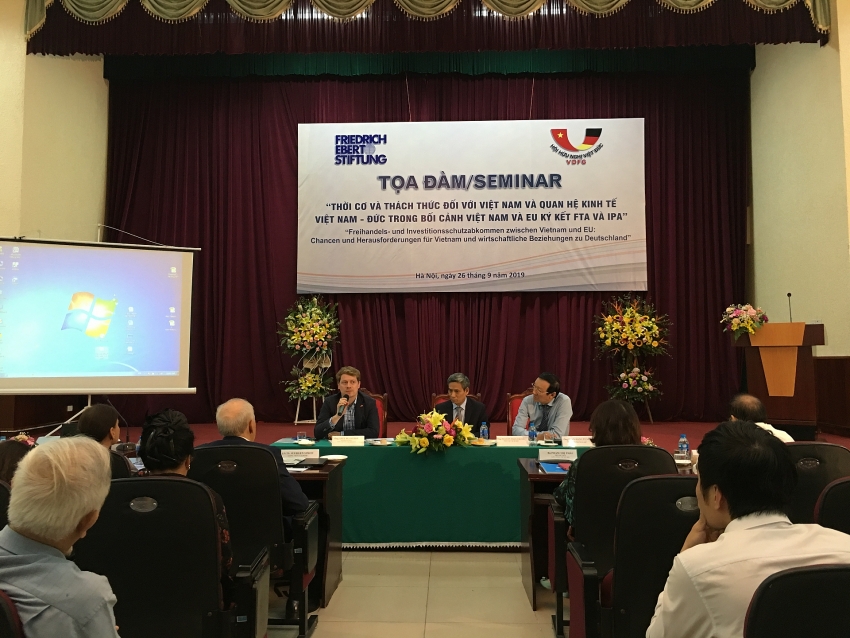EVFTA to create opportunities for Vietnam and Germany
 |
| The seminar on the EVFTA and Vietnamese-German relations |
The opportunities were discussed at a seminar on the economic relationship between Vietnam and Germany that was organised after the EVFTA and the accompanying investment protection agreement (EVIPA) were signed. The event was organised by the Friedrich Ebert Foundation and the Vietnam-Germany Friendship Association in Hanoi on September 26.
In the framework of the seminar, delegates provided an overview on the negotiations as well as the main contents of the free trade deal and its impact on the import-export turnover and GDP of Vietnam. Besides, delegates highlighted important issues for Vietnam to consider during the implementation of the agreement. Additionally, they provided an overview of the economic and trading relations of Vietnam and Germany.
According to Luong Hoang Thai, director of the Ministry of Industry and Trade's (MoIT) Multilateral Trade Policy Department, in case the EVFTA will enter into effect in 2020, Vietnam will begin seeing increasing import-export turnover to the EU and subsequently a boost to its GDP. Notably, the import turnover from EU is expected to increase by 15.28 per cent in 2020, 33.06 per cent in 2025, and 36.7 per cent in 2030. The figures for export turnover to the EU will be 20 per cent in 2020, 42.7 per cent in 2025, and 44.37 per cent in 2030. Furthermore, the GDP will see respective increases of 2.5, 4.6, and 4.3 per cent in these years.
“Leather will see the clearest changes with an average increase of 3.73 per cent in export turnover in these three years compared to 2018. The runner up will be textile and garment, while the aviation transport sector will also see an increase of 1.5 per cent by 2025,” Thai said.
In June 2019, the two parties signed the EVFTA to eliminate almost 99 per cent of customs duties. Notably, 65 per cent of duties on EU exports to Vietnam will be eliminated while the remaining will be gradually phased out over a period of 10 years. 71 per cent of duties will be eliminated on Vietnamese exports to the EU, with the remaining eliminated over a period of seven years.
The EVFTA is a new-generation bilateral agreement with content on intellectual property rights, investment liberalisation, and sustainable development.
Germany is now the largest trade partner of Vietnam in the EU and Europe in general, with two-way trade recording impressive growth in recent years. Many German firms are now successfully operating in Vietnam while German investors are arriving in droves to develop artificial intelligence, digitalisation, and startups in Vietnam. Germany also affirmed that the country is willing to invite Vietnamese businesses to join Germany’s small- and medium-sized enterprises renovation programme.
What the stars mean:
★ Poor ★ ★ Promising ★★★ Good ★★★★ Very good ★★★★★ Exceptional
Themes: EVFTA & EVIPA
Related Contents
Latest News
More News
- Foreign leaders extend congratulations to Party General Secretary To Lam (January 25, 2026 | 10:01)
- 14th National Party Congress wraps up with success (January 25, 2026 | 09:49)
- Congratulations from VFF Central Committee's int’l partners to 14th National Party Congress (January 25, 2026 | 09:46)
- 14th Party Central Committee unanimously elects To Lam as General Secretary (January 23, 2026 | 16:22)
- Worldwide congratulations underscore confidence in Vietnam’s 14th Party Congress (January 23, 2026 | 09:02)
- Political parties, organisations, int’l friends send congratulations to 14th National Party Congress (January 22, 2026 | 09:33)
- Press release on second working day of 14th National Party Congress (January 22, 2026 | 09:19)
- 14th National Party Congress: Japanese media highlight Vietnam’s growth targets (January 21, 2026 | 09:46)
- 14th National Party Congress: Driving force for Vietnam to continue renewal, innovation, breakthroughs (January 21, 2026 | 09:42)
- Vietnam remains spiritual support for progressive forces: Colombian party leader (January 21, 2026 | 08:00)

 Tag:
Tag:
























 Mobile Version
Mobile Version